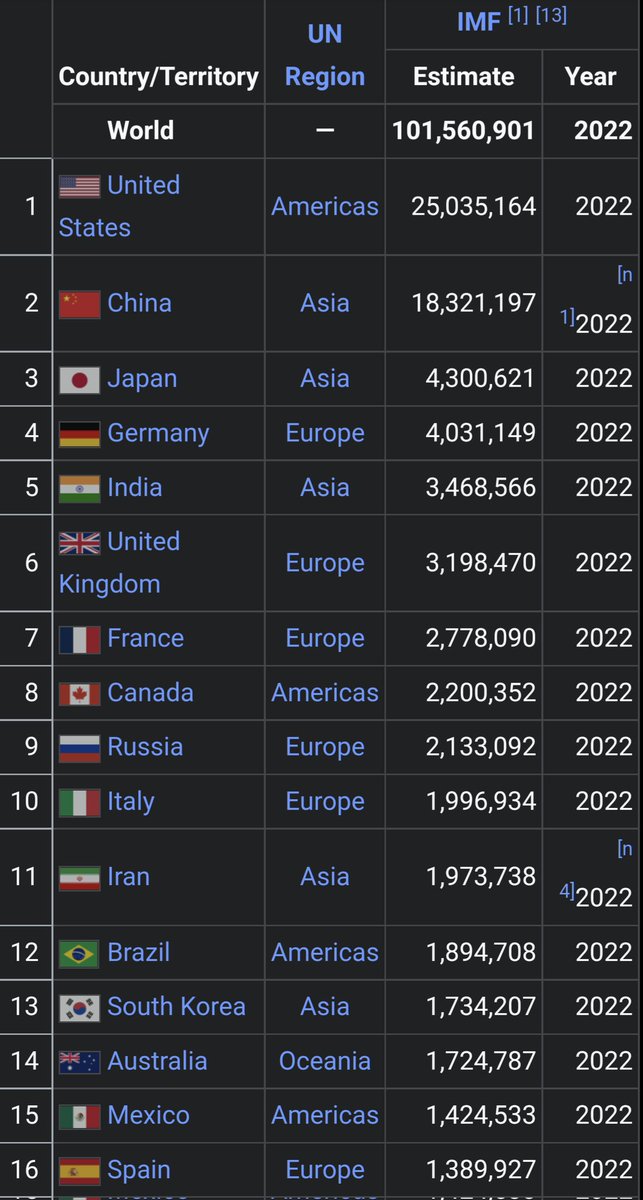
A 🧵 about #WEF2023, conspiracy theories and #Ukraine️.
I'm not a fan of conspiracy theories regarding the World Economic Forum -- the general view that they somehow control or strongly influence governments to undertake #BuildBackBetter and #GreatReset related policies...[1/n]
I'm not a fan of conspiracy theories regarding the World Economic Forum -- the general view that they somehow control or strongly influence governments to undertake #BuildBackBetter and #GreatReset related policies...[1/n]
...against the interests of the people. Of course I understand the attraction: #Davos, the WEF's annual backslapping exercise, is attended by many powerful and influential people who often *do* enact policies against the interests of their people, and Klaus Schwab looks...[2/n]
...more like a supervillain than the characters in Marvel films. But, as Thomas Fazi @battleforeurope wrote in an excellent article for @unherd, the WEF has always been quite open about its goals and ideology. Founded in 1971 by Mr Schwab, the...[3/n]
unherd.com/2023/01/how-th…
unherd.com/2023/01/how-th…
...WEF sought to improve "the state of the world through public-private cooperation." In practice, Mr Fazi (correctly) argues, this meant cutting against the United Nations idea that global decision making should be in the hands of nation states and their governments. [4/n]
Instead, Schwab and the #WEF advocate for a system where decisions involve NGOs, civil society groups, academic experts and most importantly multinational corporations. What this means in practice, Mr Fazi writes, is that policy is insulated from democracy by transferring...[4/n]
...policy decision making from the international level, where electorates have some say through their governments, to the supranational level "by placing a self-selected group of unelected, unaccountable 'stakeholders' — mainly corporations — in charge of global...[5/n]
...decisions concerning everything from energy and food production to the media and public health." And this, we can see, is *exactly* the sort of globalism we've gotten: driven by 'stakeholder' interests (mainly multinational corporations) rather than electorates or...[6/n]
...citizens. Of course, that has unsurprisingly benefitted exactly the sort of people who attend Davos (as well as the developing world middle class) even as it has immiserated and eviscerated the Western world's middle and working classes. We can see this effect in...[7/n]
...famous Elephant Chart, below. It shows the real increase in income as a percentage in each percentile of global income distribution: the developing world middle class, between the 25th and the 60th percentiles, have done well, as have the global plutocrat class...[8/n] 

...nearer the 100th percentile. The Western working and middle class, from the 70th to the 90th percentile have, on the other hand, been hammered. Which brings us to Ukraine. The #UkraineRussiaWar has done, and is doing, serious damage to the European economy. Including...[9/n]
...the UK, Europe has had to spend hundreds of billions of dollars equivalent to buy more expensive gas, some 700 billion on cushioning the blow of that to consumers, even as their industry is made uncompetitive because they can no longer buy their energy from the most...[10/n] 





...economically rational supplier. In other words, the damage is running into *trillions* after only 11 months and before secondary effects on interest rates, inflation, etc are accounted for. This raises the question: given it was obvious this would happen in the...[11/n]
...event of a breakdown of relations between Europe and Russia, why did the Europeans acquiesce so easily to the US controlling Western policy in Ukraine when it was clear for years that that was heading toward a collision? In a fascinating article for...[12/n]
...nakedcapitalism.com, Conor Gallagher suggests an answer. He points out that most of the leaders and governing parties in Europe share the WEF view of stakeholder globalism. For example, he highlights just a few of the many high offices currently occupied by WEF Young...[13/n]
...Global Leaders programme alumni. They all believe in the supranational, corporation, NGO and 'expert' driven form of policymaking, insulated at least partially from the surly business of democracy, national sovereignty and governments with popular mandates. What...[14/n] 

...do they care whether Europe still has trade? Afterall, our form of globalism doesn't care, and, as Mr Gallagher adds, "industry is an outdated concept to them". Russia, on the other hand "represents an existential threat to their ideology of oligarchic rule." There...[15/n]
...are obviously many more factors to the #UkraineRussiaWar and Europe's response to it (which are beyond the scope of this thread); however, this does offer an explanation for why those of a 'technocratic' globalist bent are so rabid on this matter, and especially the...[16/n]
...progressive left -- who I still remember protesting against the US installation of cruise and Pershing missiles in Britain and Germany, respectively, but who are now the fiercest pro war party -- something that has always puzzled me. But none of those if a conspiracy...[17/n]
...theory, and falling for them prevents a proper examination of these forces.
SOURCES:
unherd.com/2023/01/how-th…
nakedcapitalism.com/2023/01/viewin…
TAGGING:
@georgegalloway, @WomBat21204089
@emeriticus, @GerardAraud @BhadraPunchline @MoonofA @LeeBTConsulting @MarkSleboda1
SOURCES:
unherd.com/2023/01/how-th…
nakedcapitalism.com/2023/01/viewin…
TAGGING:
@georgegalloway, @WomBat21204089
@emeriticus, @GerardAraud @BhadraPunchline @MoonofA @LeeBTConsulting @MarkSleboda1
• • •
Missing some Tweet in this thread? You can try to
force a refresh

















